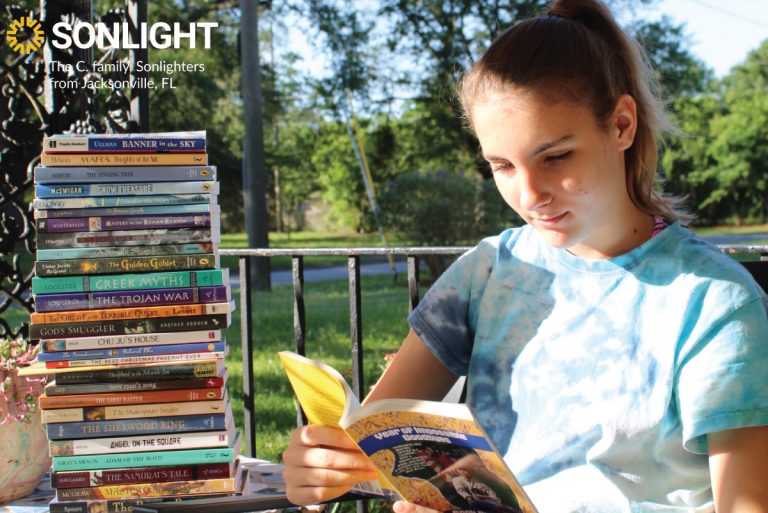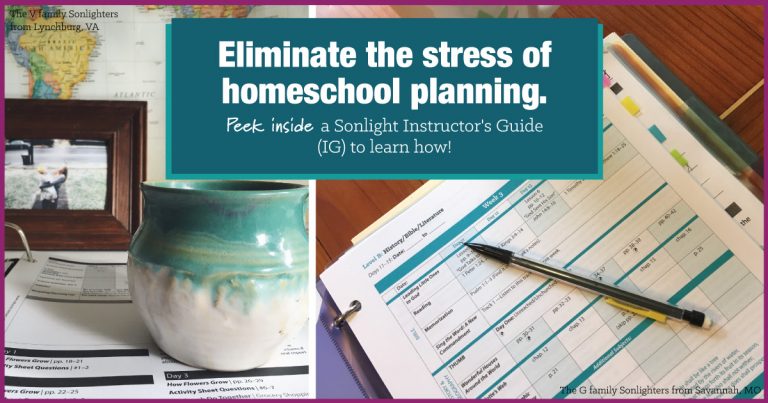When my oldest child was just shy of 4 years old, I was sure she was ready for kindergarten. She had known her shapes and colors for years, and she could read. She could recite the alphabet and do basic addition. In fact, going over the basic checklist of skills learned in kindergarten, the only one we hadn’t at least partially covered was tying her shoes. I decided to take the plunge, bought our first Sonlight curriculum, and we were ready to start.
But, almost immediately, before my first box even arrived, I was plagued by doubts and concerns.
- Am I smart enough to homeschool?
- Can I commit to a full year when I have trouble deciding what I’m going to do tomorrow?
- What do I do when I don’t know the answers?
- What if I forget to teach something vitally important?
- What if I make a mistake?
Almost every parent has the same fears upon starting their homeschooling journey. They often express feeling lost or alone, when they are anything but.

Change Is Scary
When I was younger, I went yearly to a summer camp. It was a month-long, delightful experience that included swimming in lakes, canoeing, archery, nature hikes, and more. In the evenings, we had a great time playing soccer and having campfires.
My first week at summer camp, I had such a great time, but I barely ate anything at all. The counselors were very concerned and called my mother, who immediately said, “Oh, that’s just how she is with new things. It takes her a while to get used to change.” Sure enough, after that first week, my appetite was back in full force.
Just because we enjoy something doesn’t mean the change isn’t hard.
For many of us, homeschooling is a very large change, requiring us not only to change our plans for our children’s future (and our own), but to change our very thoughts on the education system as a whole. Experienced teachers with years of classroom experience still feel trepidation when it comes to homeschooling their own children. Sunday school teachers, experienced at drawing up lesson plans and keeping lots of little children busy, are still daunted by the idea of teaching their own children. Pastors with years of experience leading their church still have doubts when it comes to leading their small flock at home.
We all feel these same concerns, regardless of our backgrounds and experience. You are not alone.
You Already Know How to Teach
Because infants don’t come with instruction manuals, most parents figure out how to teach their children as they go. Whether they read every childrearing book or rely on intuition and family advice, we all begin teaching our children from the moment of their birth. Every time we talk to them, feed them, or answer their cries, we are teaching them how to communicate, ask for food, or get comfort.
Most of us have taught our children how to walk and talk. We might point out numbers as we go through the day or practice letter sounds. We may have taught our child how to throw a ball, or share their toys, or use proper manners at the table.
Yet when we think of teaching children academics—how to read, or write an essay, or how to do algebra—many of us panic.
Sonlight Breaks it Down into Easy Steps
One reason I love Sonlight is how the Instructor’s Guides (IGs) anticipate all these questions and makes it easy to overcome them. By using Sonlight’s reading program, I know exactly what and how much to teach each day. The next day, I simply do the next lesson.
We practice writing essays when they are fairly young, using Sonlight’s Language Arts program. By following the organizers and plans, we gradually work our way up to more difficult papers and longer essays through the years.
When we pull out our Math U See Algebra workbook, we get a great video teacher to go along with it, who shows us exactly how to lay out a problem and solve it.
By following the IG, I can teach my children academics almost as easily as I taught them to walk.
God Knew What He Was Doing When He Chose You
God knew from the beginning that you were going to be your child’s parent. He knows you might have struggled in math in high school, or have no idea what a good English paper should look like, or have no attention span at all.
For whatever reason, God chose you to be your child’s teacher. That means that you CAN homeschool!
Whether God wants this experience to last just a few weeks or far longer, God’s plan included this moment.
It might not make sense. There might be someone else who could teach science or math better than you can. But there is something about you, at this moment, that your child can get only from you.
No One Expects You to Know All the Answers
No one knows everything, except God, of course. Think of someone with a great mind.
- Steven Hawking
- Albert Einstein
- Marie Curie
- Leonardo da Vinci
- George Washington Carver
None of these people knew everything.
What all of these people had in common is their passion for study and research. They looked up answers to things they didn’t know and read books about things they didn’t understand. They amassed great knowledge by getting help, and then used that knowledge to explore further.
Homeschoolers today have such a wide variety of resources to help them when they struggle. If you don’t know how to teach math very well, Sonlight carries programs that will teach you how to teach math (or teach for you). If you struggle in an area, Sonlight Connections is an app - an online community - where you can ask questions from other Sonlighters. When your kids can’t seem to figure out how to write a paper, Sonlight has Advisors on hand who can offer some insight. There are vast online communities to help with almost any problem or concern.
And, of course, we have God, who will help us teach our children.
God Loves Your Children More than You Do
This phrase is a source of comfort to me. I feel relieved to know I’m not alone on this journey. No matter what I do, no matter how I fail or what mistakes I make, God has a plan for my children, and he’s going to see his plan through despite me. God also loves your children and has a plan for them. It might not look like your plan for them, but his plan is better because it's his, and he will provide them with what they need when they need it.
So if my dyslexic son just can’t seem to progress in reading, or if my high schooler can’t seem to grasp geometry today, I can relax, knowing that God is ultimately in control. If I miss something vitally important, God will make sure He covers it for me. He loves me and he will help me homeschool.
Learning Doesn’t End at Graduation
In the midst of all the things we need to teach, it's easy to forget that senior year of high school is not the end of one's education. My child can still learn geometry at 24 or physics at 44. There is more than what we teach them at home, and that no matter how hard we try, we can never even begin to teach it all. They can still learn more later on in life.
I’m going to share something with you that I've learned after homeschooling for 14 years. You’re going to make mistakes. I certainly have—repeatedly. You aren’t going to know all the answers or even how to find them. School is sometimes going to be a war, and you’re going to have to pick your battles. You’re going to have great days and bad days, and sometimes, the bad days will outnumber the good days.
But even if you sent them to the best schools with the best equipment and the best teachers, there will still be times when neither you nor their teachers know the answers. There will be battles over homework and great days and awful days. You will still make mistakes, and so will the school.
But for the time that you do homeschool, you get to have it all: the good and the bad, the beautiful and the messy, the tears and the joys. And, for this moment in time, your children get you in the moment, with them. So when you ask, "Can I homeschool?" The answer is yes, you can.
Ready to take the leap to homeschooling? Click the button to start shopping.









